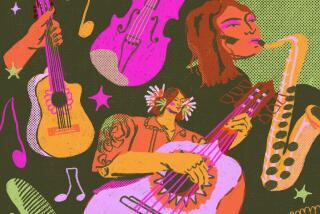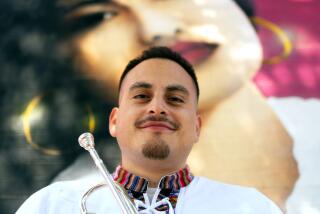PARAGUAYAN HARP IS SIREN TO SAN DIEGAN
- Share via
SAN DIEGO — With an instrument as exotic as the Paraguayan harp, one might expect the Anglo performer to be a scholarly ethnomusicologist. Ed Lange’s scholarship, however, has concentrated on physics and the sea. Yet the UC San Diego-trained oceanographer is both an accomplished performer on this unusual instrument and an avid apologist for the musical culture of Paraguay.
When Lange visited Paraguay in 1984 and played his harp in that nation’s capital, Asuncion, he learned something about the cross-cultural static such a musical achievement creates.
“If you get good on an instrument from another culture, they don’t know what to think. ‘The gringo is good, but he’s a norteno ,’ they would say. It would be like someone from there coming up here and learning to play the banjo,” Lange said.
Saturday night, Lange will perform on the Paraguayan harp at the Words and Music bookstore in Hillcrest, a popular venue for local classical and folk artists. The next day, he will leave for a three-month sojourn to Paraguay to add to his repertory and to answer some of the many questions that have vexed him about the musical traditions surrounding the instrument that has changed his life.
It was just a year ago that Lange, 45, decided to terminate his 12-year oceanographic career and turn all of his attention to music. “I had come to a natural stopping place,” he said. “Last year was a kind of resurrection--during this time music became central. It was my therapy.”
Lange had discovered the Paraguayan harp in his student days, learning to play it largely from recordings of South American music. His previous musical experience was limited to playing trumpet in school orchestras. Playing his harp at a busy Mexican restaurant in La Jolla helped put him through graduate school. Later, he took it with him on oceanographic expeditions.
“When we went to Antarctica, I took a small version of the harp with me and gave concerts for members of the group. They made a big thing of it, setting up microphones and giving formal introductions.” On his way back from that expedition, Lange made his first trip to Paraguay.
The diatonic folk harp is Paraguay’s national instrument. While the folk harp is an important instrument in many South American countries, the Paraguayan harp has been the dominant influence on all other Latin American harp traditions.
“The harp came to Paraguay with the Spanish Jesuit missionaries, and the Paraguayan harp is a lot like the old Spanish harp of the 1600s,” Lange said.
“The harp is everywhere in Paraguay--it’s a symbol of the culture. Unlike this country, music down there is a full career. It even promises to get people out of Paraguay, especially to Europe, where its music has been popular for a long time. The Paraguayan harp is well received outside of its native country, unlike a folk instrument such as the North American hammered dulcimer. The Paraguayan harp is also popular in China and even in Micronesia.”
Lange told of his encounter in Paraguay with an accomplished Japanese koto player who had come to South America to learn the harp in order to made her career as a harpist in Tokyo.
According to Lange, the Paraguayan harp is just starting to catch on here. “When I was playing initially, people would say, ‘What’s that, some kind of guitar?’ Now they come up and ask for specific Paraguayan songs.”
Unlike the lush, Impressionistic sonority associated with the modern orchestral harp, the Paraguayan harp has a forceful, brilliant sound, rich in overtones. The instrument is about 5 feet high, constructed entirely of wood, which makes it light in weight. It has 30 to 40 nylon strings, although traditionally the strings were gut.
Because of its power and the wide range of music it can play, “the Paraguayan harp is the poor man’s piano,” Lange noted.
The harp is played in a vigorous manner to create a dense texture jostled with the cross rhythms of festive Paraguayan dances. “In Paraguay, the harp players traditionally are men, and the music is played very aggressively,” he said. “I have heard women play the Paraguayan harp, but I have yet to hear one who plays with such aggression. Women do better playing and composing the slow songs. It is a very macho country. If women were to start playing that way, it would not be accepted.”
More to Read
Sign up for Essential California
The most important California stories and recommendations in your inbox every morning.
You may occasionally receive promotional content from the Los Angeles Times.













